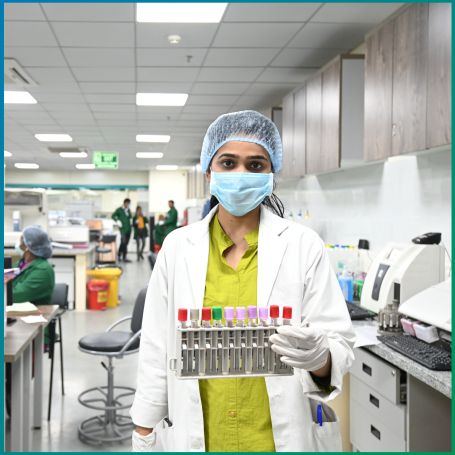
Swab Culture is a laboratory test that collects samples from a specific body area to identify infectious organisms and determine the appropriate treatment.

A swab culture test is used to detect and identify microorganisms such as bacteria, fungi, or viruses in various body sites. It involves taking a sample from areas like the throat, nose, wound, or other affected sites to determine the presence of infection.
1. Diagnosis of Infections: This test is essential for diagnosing infections, helping healthcare providers identify the specific pathogen causing the illness, and guiding appropriate treatment.
2. Antibiotic Sensitivity Testing: In addition to identifying the pathogen, swab cultures can also determine the sensitivity of bacteria to different antibiotics, aiding in the selection of the most effective treatment.
3. Monitoring Chronic Conditions: For patients with chronic wounds or recurrent infections, regular swab cultures can monitor the infection status and guide ongoing treatment.
1. Sample Collection: A healthcare professional collects a sample using a sterile swab. The swab is rubbed against the infected or suspected area, such as a wound, throat, or nasal passage.
2. Laboratory Analysis: The collected swab is placed on a culture medium in a laboratory, where it is incubated to allow any present microorganisms to grow. This process can take anywhere from 24 hours to several days, depending on the organism.
3. Result Interpretation: After incubation, the laboratory analyzes the growth and identifies the microorganisms present. Results are reported, often including recommendations for treatment based on antibiotic sensitivity.
When searching for a pathology lab test near me for a Swab Culture Test in Pune, Diagnopein is the ideal choice. As an NABL accredited lab, Diagnopein upholds stringent quality standards to ensure precise and reliable results. The laboratory utilizes state-of-the-art equipment and techniques, and its skilled professionals ensure accurate and thorough testing. Whether you need a swab culture to diagnose infections or monitor healing, Diagnopein guarantees accurate reports that provide clear insights for effective treatment. With a focus on quality care, timely results, and patient satisfaction, Diagnopein stands out as a trusted partner for all your diagnostic needs.
1. Culture Method
2. Sample
3. Colony Count
4. Organism(s) Isolated
5. Culture Report: Culture yields growth of
6. Culture isolated after 7 days :
7. Culture isolated after 14 days:
8. Culture isolated after 21 days:
9. Ampicillin
10. Amikacin
11. Amoxicillin clavulanate
12. cefoperazon+sulbactam
13. Cefuroxime
14. Cefepime
15. Cefotaxime
16. Ciprofloxacin
17. Ertapenem
18. Gentamicin
19. Imipenem
20. Meropenem
21. Norfloxacin
22. Nitrofurantoin
23. Piperacillin-tazobactam
24. Trimethoprim-Sulfamethoxazole (Cotrimoxazole)
A healthcare professional uses a sterile swab to collect a sample from the affected area, such as a throat or wound, ensuring proper technique to avoid contamination.
The test is generally low-risk, with potential discomfort during sample collection but minimal risk of complications.
Results typically take between 24 hours and several days, depending on the type of microorganism being tested and the culture conditions.
Swab cultures can identify bacterial, fungal, and viral infections, commonly performed for throat, wound, urine, or respiratory infections.